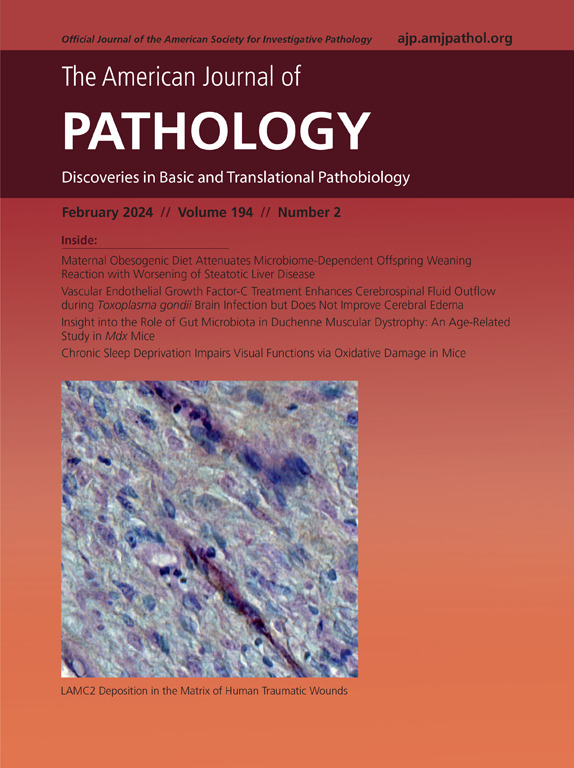Macrophage–Kruppel-Like Transcription Factor 6 Signaling Promotes Experimental Atherogenesis
IF 3.6
2区 医学
Q1 PATHOLOGY
引用次数: 0
Abstract
A hallmark event in the development of atherosclerotic plaque is the accumulation of lipid-laden macrophages in the subendothelial layers of affected blood vessels. Macrophages are key players in all stages of atherogenesis, including plaque initiation, growth, and rupture, as well as healing of ruptured plaques. In this context, macrophages are the principal innate immune cells that modulate atherogenesis by engaging in various processes, such as inflammation, extracellular matrix degradation, phagocytosis, and efferocytosis. In the current study, Kruppel-like transcription factor 6 (KLF6) deficiency attenuated proinflammatory gene expression in macrophages and experimentally induced atherosclerotic plaque development. In vivo studies showed that myeloid-KLF6 deficiency on Apoe-null background significantly curtailed high-fat/high-cholesterol diet-induced atherosclerotic lesion formation and macrophage abundance in atherosclerotic plaques. Integrated transcriptomics and Gene Set Enrichment Analysis showed that KLF6 deficiency significantly curtailed a large number of tumor necrosis factor (TNF)–induced gene targets, TNF-induced interferon-γ response, interferon-α response, and inflammatory response signaling in macrophages. At the molecular level, KLF6 promoted interferon regulatory factor 1 (IRF1) signaling to enhance TNF-induced proinflammatory gene expression in macrophages. Collectively, study results show that KLF6 promoted proinflammatory gene expression in macrophages and enhanced experimentally induced atherosclerotic plaque formation in vivo.
巨噬细胞-克虏伯样因子6信号传导促进实验性动脉粥样硬化。
动脉粥样硬化斑块发展的一个标志性事件是脂质巨噬细胞在受影响血管内皮下层的积累。巨噬细胞在动脉粥样硬化的所有阶段都起着关键作用,包括斑块的形成、生长、破裂以及破裂斑块的愈合。在这种情况下,巨噬细胞是主要的先天免疫细胞,通过参与各种过程,如炎症、细胞外基质降解、吞噬和efferocytosis,来调节动脉粥样硬化的发生。本研究表明,Kruppel-like factor 6 (KLF6)缺乏可减弱巨噬细胞中促炎基因的表达,并通过实验诱导动脉粥样硬化斑块的形成。体内研究表明,在apoe缺失的背景下,骨髓- klf6缺乏显著减少高脂肪/高胆固醇饮食诱导的动脉粥样硬化病变形成和动脉粥样硬化斑块中巨噬细胞的丰度。整合转录组学和基因集富集分析显示,KLF6缺失显著抑制了巨噬细胞中大量肿瘤坏死因子(TNF)诱导的基因靶点、TNF诱导的干扰素-γ反应、干扰素-α反应和炎症反应信号。在分子水平上,KLF6促进IRF1信号传导,增强巨噬细胞中tnf诱导的促炎基因表达。综上所述,研究结果表明,KLF6促进巨噬细胞中促炎基因的表达,促进实验诱导的体内动脉粥样硬化斑块的形成。
本文章由计算机程序翻译,如有差异,请以英文原文为准。
求助全文
约1分钟内获得全文
求助全文
来源期刊
CiteScore
11.40
自引率
0.00%
发文量
178
审稿时长
30 days
期刊介绍:
The American Journal of Pathology, official journal of the American Society for Investigative Pathology, published by Elsevier, Inc., seeks high-quality original research reports, reviews, and commentaries related to the molecular and cellular basis of disease. The editors will consider basic, translational, and clinical investigations that directly address mechanisms of pathogenesis or provide a foundation for future mechanistic inquiries. Examples of such foundational investigations include data mining, identification of biomarkers, molecular pathology, and discovery research. Foundational studies that incorporate deep learning and artificial intelligence are also welcome. High priority is given to studies of human disease and relevant experimental models using molecular, cellular, and organismal approaches.

 求助内容:
求助内容: 应助结果提醒方式:
应助结果提醒方式:


